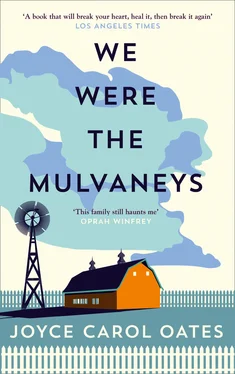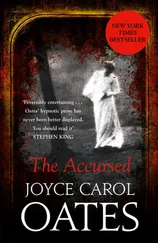Heavy rusted wrought-iron garden furniture, a “gothic revival” settee, a “rococo revival” chair of exquisite cast-iron filigree, willow ware settees and headboards, that twisty furniture made of gnarled tree limbs with bark still intact—“naturalistic style,” of the turn of the century; native willow and imported rattan and much-varnished aged wood that looked as if it would disintegrate into its molecules if anyone’s weight was lowered upon it. There were dining-room sets, battered drop-leaf maplewood tables and matching chairs with split rush seats; there were stacks of dust-limp lampshades, lamps of yellowed carved ivory, free-standing gilt-stenciled “Doric columns,” even a broken-stringed harpsichord with keys the color of English breakfast tea. There were lacquered surfaces, grimy-fabric surfaces, splotched-mirror surfaces, porcelain and marble and stone and concrete (urns, dogs, horses, a ghastly white-painted “darky” holding out a fingerless hand for an invisible horse’s rein). There was a counter of shoe boxes stuffed with aged postcards dated 1905, 1911, 1923, handwritten, in the scrawled and faded and frequently indecipherable hands of strangers; penny postcards bearing vista-views of the Chautauqua Valley, photographs painted over to resemble watercolors in romantic pastel hues, selling for as little as one dollar a dozen. (If Corinne could sell them at all.) Marianne couldn’t resist, pulled out a card at random, a sunset scene of canal barge, yoked mules and mule driver titled Erie Barge Canal at Yewville, N.Y., 1915 . On the reverse was a message in near-invisible blue ink, in a woman’s flowery hand: Hello Rose! Suppose you think I am dead. But I am not, very much alive instead. How are you all? & are you still in the same house? Let me hear from you. All O.K. here except for Ross & grandma, no change. Love to all & the baby too. Yr. sis. Edna . It was dated Fri. P.M., July 16. Hastily Marianne put the card back in the shoe box and moved on. If she began reading through these old cards she’d lose herself for an hour.
Some of them she’d stolen away to keep in her room. They sold so cheaply, it seemed a shame. Such tragically real and unique and irreplaceable documents. Corinne agreed they were precious but then everything in her antique barn was precious wasn’t it?—that was the point of antiques wasn’t it?
Behind stacks of water-stained and -warped old books—James Fenimore Cooper’s The Pathfinder , Winston Churchill’s A Modern Chronicle , Hamlin Garland’s A Son of the Middle Border, A Children’s Garden of Poesy and several volumes of Reader’s Digest Books, Information Please Almanac 1949 —partly covered by a kerosene-smelling ratty old quilt, Marianne found what she was searching for. A framed reproduction of an antiquated painting by an unknown artist, titled The Pilgrim: a romantically twilit vista of mountains, a woodland lake, light radiating from a likeness of Jesus’ face in the sky falling upon a robed figure kneeling in a meadow of grazing sheep and lambs beside the glistening water. The figure was barefoot and seemed to have made her way across a rocky terrain; her profile was partly obscured by a plait of faded gold hair and a shawl modestly covering her head. Beneath the title was the caption, which Marianne found thrilling: He that loseth his life for my sake shall find it .
Corinne had brought The Pilgrim home years ago from a flea market and hadn’t sold it though the price had been lowered several times, rather conspicuously—$25, $19.98, now $12.50. (How did Corinne determine these prices, anyhow? She seemed to have, as Michael Sr. observed, an unfailing instinct for keeping them just high enough to discourage potential buyers.) Marianne recalled Patrick saying of the reproduction, What cornball stuff, Mom! and she supposed she had to agree, yes it was sentimental and silly, bad as the worst of Sunday school Bible cards, Jesus floating in the sky like a balloon, the lambs gathered around the pilgrim like wooden toys with disconcertingly humanoid faces. Still, Marianne found the image fascinating, like a riddle to be decoded. Many times she’d asked Corinne who was the pilgrim, and where had she come from? She was alone—why? She seemed quite young, only a girl. Was she about to die, and that was why Jesus smiled down upon her from the clouds? Yet she did not appear injured or exhausted; in her very posture of humility, head bowed, hands clasped and uplifted in prayer, there was a suggestion of pride. Clearly the pilgrim was praying to Jesus, unaware of Him though His rays of light illuminated her out of the shadow.
Corinne found The Pilgrim fascinating, too. She had the idea it was based on some German folktale, she didn’t know why. And the caption wasn’t accurate, exactly: it should have been She that loseth her life for my sake shall find it .
Marianne drew her fingers across the glass, trailing dust. She squatted beside the painting, staring avidly at it, her eyes misting over in tears. She felt a surge of happiness sharp as pain in her heart.
She hadn’t actually seen The Pilgrim in a long time and had more or less forgotten it. Yet, evidently, she’d been thinking of it the previous night, soaking in Trisha LaPorte’s bathtub. Numbed, dazed. Her thoughts flying rapidly and fluidly and without weight or seeming significance. Jesus help me. Jesus help me . Like scenes glimpsed from the window of a speeding vehicle, lacking depth and color. Like those strange fleeting faces, strangers’ faces, some of them distorted and grotesque, we see as we sink exhausted into sleep. So, amid the steaming water, above a limp-floating naked girl’s body, a body at which Marianne did not look, The Pilgrim rose, took shape. It hovered suspended until finally it faded into numbness and oblivion, a gouged-out hole in the very space of consciousness.
So much to talk about! So many interruptions! Laughter, and Judd scolded by Dad for passing sausage-bits to Little Boots beneath the table, and Mom scolded by Dad Honeylove will you for God’s sake stop jumping up every five minutes? —and the discovery, midmeal, that the oven was still set at four hundred degrees and the Mexican chicken-shrimp-sausage casserole was beginning to burn. Marianne had helped Mom prepare supper as usual as if nothing were wrong, so perhaps nothing was wrong. In addition to the super-casserole there was grilled Parmesan-dill bread, baked butternut squash sprinkled with brown sugar, a giant tossed salad with Mom’s special oil-and-vinegar dressing, homemade apple-cinnamon cobbler with vanilla ice cream. How many suppers, how many meals, here in the big cozy country kitchen at High Point Farm: you might bear the memory into eternity, yet each occasion was unique, mysterious.
In a haze of smiling, nodding, chewing, swallowing Marianne navigated the hour-long meal. Not quite so talkative, smiling, happy as usual but maybe no one noticed? (Except Mom?) Mikey-Junior was away with his girl Trudi Hendrick ( Are those two getting serious? Mom’s worried, wondering) but all the other Mulvaneys were in their usual seats. And all hungry.
You know you want to, why’d you come with me if you don’t?
Nobody’s gonna hurt you for Christ’s sake get cool .
Talk swirled around Marianne’s head like confetti. She was listening, yet seemed not to hear. Did they glance at her oddly?—or not notice a thing? There was a buzzing in her ears remote as wasps, in summer, under the eaves. That ache like weeping in her loins. (Don’t think: va-gin-a . Ugly words like ut-er-us, clit-or-is.) Marianne leapt up to save Mom a trip, carrying the heated casserole back to the table; passed the newly replenished bread basket back to Dad, the salt-free margarine, the hefty gleaming “Swedish” salad bowl. Mom was telling them excitedly of the candidate she and church friends intended to campaign for, in the upcoming Presidential election, Jimmy Carter—“A true Christian, and an intelligent, forceful man.” Dad murmured in an undertone, with a wink for the kids, “Rare combo, eh?” but Mom chose to ignore the remark; tried never to argue at mealtimes, on principle. Next was talk of the icy roads, Monday morning’s predicted weather (snow flurries, wind-chill temperatures as low as minus twenty). Talk of upcoming dental appointments (Patrick, Judd—both groaned), a vet appointment (for poor Silky, whose teeth were getting bad). Dad brought up the subject of the bid Mulvaney Roofing had made last Monday to the contractor for the St. Matthew’s Hospital addition, one of seven bids from local roofers, so far as he knew; a decision was due soon, maybe this week. With a shrug of his burly shoulder meant to disguise the hope and anxiety he felt, Dad said, grinning, “Well, as the fella says, ‘No news is good news.’ Right?” Mom interjected in her way of thrusting her head forward, gawky-girl style, with her neighing laugh, “‘No noose is good noose’—as the condemned man said on the scaffold.”
Читать дальше












